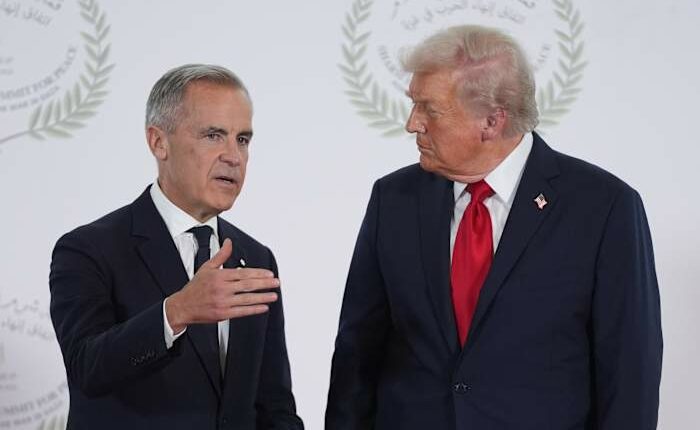Share this @internewscast.com

TORONTO, ONTARIO – Canadian Prime Minister Mark Carney revealed that he advised Ontario’s premier against launching an anti-tariff advertisement, which resulted in U.S. President Donald Trump halting trade discussions with Canada.
Carney acknowledged that he extended an apology to President Trump during a dinner at the Asia-Pacific Economic Cooperation summit, explaining that the president had been “offended” by the advertisement.
The Ontario commercial, broadcasted in the United States, criticized Trump’s tariff policies by referencing a famous speech by former U.S. President Ronald Reagan.
This advertisement provoked President Trump, leading him to cease trade negotiations with Canada and announce plans to increase tariffs on Canadian imports by an additional 10%.
When questioned on Saturday about Ontario Premier Doug Ford’s reaction to the request not to air the ad, Carney remarked, “Well, you saw what the outcome was.”
“It’s not an approach I would have pursued,” Carney commented at a press briefing as he concluded his nine-day tour in Asia.
Ford is a populist Conservative while Carney is a Liberal. As premier, Ford is the equivalent of a U.S. governor.
“I’m the one who is responsible, in my role as prime minister, for the relationship with the president of the U.S., and the federal government is responsible for the foreign relationship with the U.S. government,” Carney said.
A spokesperson for Ford didn’t immediately respond when asked if Carney told Ford not to run the ad.
Ford previously said Carney and Carney’s chief of staff watched the ad before it was released.
Ford pulled the ad last Monday but allowed it to be shown in the first two games of the baseball World Series.
Trump said the ad misrepresented the position of Reagan, a two-term president and a beloved figure in the Republican Party. But Reagan was wary of tariffs and used much of the 1987 address featured in Ontario’s ad spelling out the case against them.
Trump has complained the ad was aimed at influencing the U.S. Supreme Court ahead of arguments scheduled this month that could decide whether Trump has the power to impose his sweeping tariffs, a key part of his economic strategy. Lower courts had ruled he had exceeded his authority.
Carney met with Trump at the White House last month and has been trying to secure a trade deal to lower some tariffs on sectors like steel and aluminum. Tariffs are taking a toll in the aluminum, steel, auto and lumber sectors.
More than three-quarters of Canadian exports go to the U.S., and nearly 3.6 billion Canadian dollars ($2.7 billion) worth of goods and services cross the border daily.
Copyright 2025 The Associated Press. All rights reserved. This material may not be published, broadcast, rewritten or redistributed without permission.









